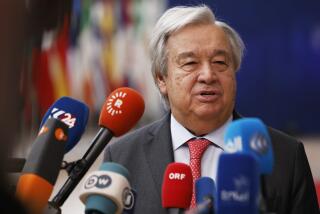Europeans Rule Out Iraq Compromise : Policy: Twelve foreign ministers vow to keep up the pressure. They differ on creating a security arm within their alliance.
- Share via
LONDON — The foreign ministers of the European Community agreed Sunday that there could be “no compromise” with Iraq over the U.N. resolutions on the issue of Kuwait.
At a meeting in Asolo, Italy, the senior diplomats of the 12 EC nations declared that the pressure must be kept up on Iraqi President Saddam Hussein to withdraw his forces from Kuwait, which he invaded Aug. 2.
British Foreign Secretary Douglas Hurd said after the two-day informal meeting that pressure must be applied through the continued threat of military force, diplomatic isolation and far-reaching economic sanctions against Iraq.
While the foreign ministers expressed unanimity on maintaining a solid West European front against Iraq’s aggression, there was a differing view on seeking a security component within the EC.
Gianni De Michelis, the foreign minister of Italy, which currently has the EC presidency, has called for a new Treaty of Rome, the founding document, which might incorporate the growing move toward closer political union.
A December conference has been scheduled to look into ways that a closer political union can be established.
De Michelis has also proposed that the EC establish a mechanism that can provide a defense structure within the organization.
At the same time, France and Germany have suggested new concepts under which foreign and security policy would be decided by a majority vote, rather than the usual “consensus” that governs such major decisions.
Britain, whose decision to add the pound to the exchange rate mechanism of the European Monetary System was warmly applauded, threw some cold water on the grander plans for an EC joint defense arm.
Britain’s Hurd said that while the community should take steps to strengthen the North Atlantic Treaty Organization’s so-called European pillar, no moves should be made that would weaken transatlantic solidarity with the United States and Canada.
“For us,” said Hurd, “NATO will remain the prime forum for collective security policy.”
French Foreign Minister Roland Dumas urged the EC to look at ways in which it could strengthen its collective security within the community, declaring that it should agree to have a common policy in areas where it had common values and interests.
Dumas said the current Persian Gulf crisis is an example of an area where the EC should have common foreign and defense policies.
In addition to Britain, France, Italy and Germany, the other EC members are Belgium, Denmark, Greece, Ireland, Luxembourg, the Netherlands, Portugal and Spain.
More to Read
Sign up for Essential California
The most important California stories and recommendations in your inbox every morning.
You may occasionally receive promotional content from the Los Angeles Times.












